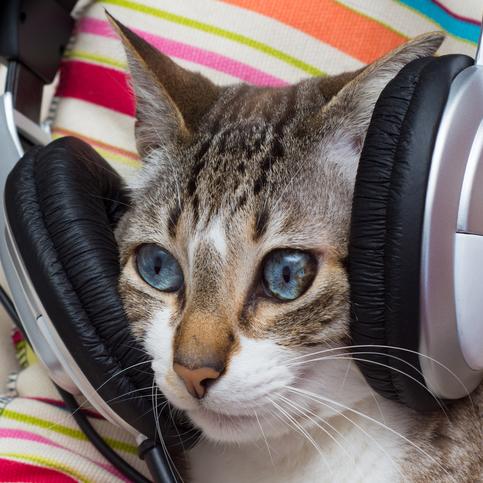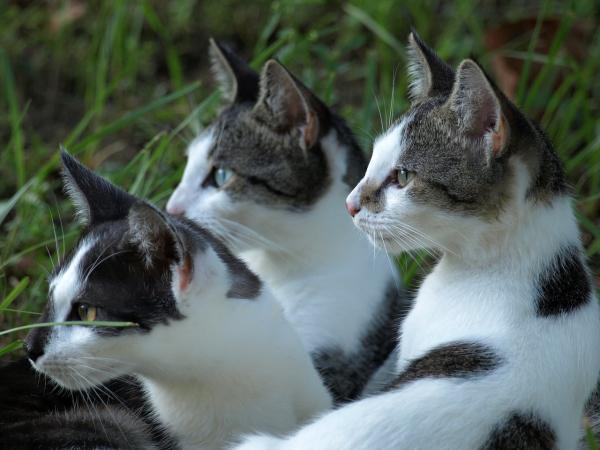Do cats like music?

Si cats like music or not It is a question that is repeated a lot among lovers of cats, and thanks to numerous studies and scientific experiments we can answer clearly: cats enjoy listening to certain types of music.
Cat lovers know that very loud sounds tend to annoy cats, but why is this? Why some sounds yes and others no? Can the sounds that they emit have a relationship with musical tastes? This particular subject I was passionate about studying when a piano teacher client came to me who taught classes in her home and when her cat got angry with her, or certain students, she used the scratching piano, and there was no one who could stop it.
We will tell our opinions, studies that sustain them and, finally, we will respond: Do cats like music?
The organ of the felines
Because cats’ favorite language is smell, we know that to communicate they prefer smelling signals. However, they also use the language of sound with, according to experts, up to twelve different sounds, that often only among them they will be able to differentiate but it will help us to explain the tolerance to our sounds.
It is not a novelty that cats have an ear more developed than ours. I do not mean physically, but to the sense of hearing, detecting sounds that many times we will never get to perceive. Their universe ranges from a gentle purr of children to the grunts or snorts of adults in the middle of a conflict. Each one of them are contemplated according to duration and frequency, which would be the intensity of the sound in its measure, through the hertz.
Let’s get a little more scientists to explain this, as it will be very useful when understanding the reactions of our animals and determine if cats like music. The hertz or hertz (the latter in honor of who has discovered it) is the unit of frequency of a vibratory movement, which in this case is about sound. Here is a short summary of the ranges that we can hear the different species:
- Wax Moth (the highest quality audio), up to 300 kHz.
- Dolphins, from 20 Hz to 150 kHz (seven times more than humans).
- Bats, from 50 Hz to 20 kHz.
- Dogs, from 10.000 to 50.000 Hz (four times more than us).
- Cats, from 30 to 65.000 Hz. (explains a lot, right?).
- Human, between 20 Hz (lowest) to 20.000 Hz (most acute).

Interpretation of sounds by cats
Already getting deeper into the subject and the question that arises here about whether cats like music, we will say that high-pitched sounds (close to 65.000 Hz) correspond to calls of puppies to their mothers or other siblings, and the most serious sounds ( those of less Hz) usually correspond to adult cats on alert or threatening, so they can arouse concern to those who hear them.
Let’s pay attention to the meow of the kitten, which to the amazement of many readers is not part of the repertoire of communication with their kind, it is just a sound to communicate with us. The cat’s meow it is an “invention of animal domestication” through which they can communicate with humans. These sounds are short voices from 0,5 to 0,7 seconds, being able to reach 3 or 6 seconds, according to need to be attended by their mother. Within the age of 4 weeks of life, in cases of cold or danger, we will have the “infantile calls”. According to experts specialized in this topic, cold calls occur up to 4 weeks of life, since they can then thermoregulate themselves, and are usually the most acute; those of solitude are usually long in duration, as if it were a maintained tone, and those of confinement with greater gravity.
The purring It is usually the same in all stages of life, it does not change, unlike the infantile calls that disappear over the month of the kitten’s life to give way to the meow. But these would be the ways of communication that our cats have depending on the situation, but we also have snorts or grunts, which are more serious tones, through which they indicate a threat or that they feel cornered.
It is important to learn to read the sounds of our cats to understand, in their language, what they want to transmit to us and, in this way, to know them better every day. For this, do not miss our article on the language of cats.

Music for all ears
To close the topic, we will recognize that we relax the harmonic sounds, but there are still doubts in the felines. What we can be sure of is that the very strong music stresses and makes them nervous, while the soft music achieves a state of relaxation in them. For this reason, considering that we share a home and are part of our family, we will try our best for them and avoid intense sounds.
Within the realm of animal music therapy there are already numerous successes of musicians such as Felix Pando, an American musician who performed aof Mozart and Beethoven melodies under the title of “Classical music for dogs and cats” They can be downloaded on the Internet, like many other titles. We just have to find out what makes us happiest and our pet’s reaction.
All this said, Do cats like music? YesAs we said, they appreciate listening to soft music, like classical music, that does not disturb their well-being.

If you want to read more articles similar to Do cats like music?, we recommend that you enter in our Curiosities section of the animal world.


